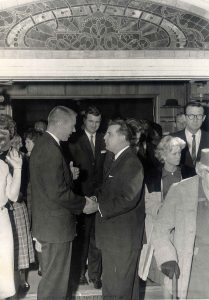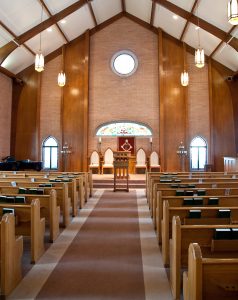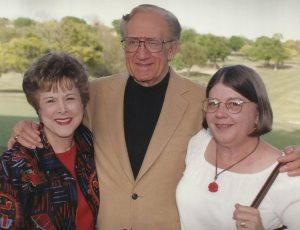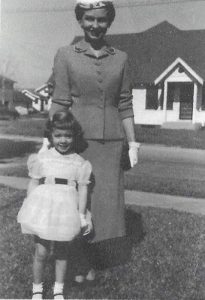Editor’s note: Lawanna McIver Fields died at her home in Nashville, Tenn., Nov. 5. She was well known in Baptist circles for a number of reasons, among them her role as a lay leader at Wilshire Baptist Church in Dallas where her first husband, Bruce McIver, served as pastor for 30 years. When she married Bruce, he had a young daughter named Kate, who is the author of this piece. Bruce and Lawanna then had two other children together, Shannon and Renie. After Bruce died in 2001, Lawanna married W.C. Fields, who also was well known in Baptist life. He preceded her in death. Lawanna’s services will be held in Dallas at a later date.
A couple of years ago, I completed a 300-page memoir (as yet unpublished) called “The Forever Staircase.” It focuses on the loss of my birth mother, Jean, when I was 4, the next years when Daddy and I were together, and Dad’s remarriage to Lawanna, who I sometimes refer to as “my second mother.”

Bruce McIver (center right) greeting worshipers in the 1950s.
After Mom read my completed memoir, she wept and said, “I can die happy now!” Even though I’ve dawdled about publication, I’m happy I was able to share the completed book with Mom.
The last chapter of the memoir is titled “Through Years Unnumbered.” I did not attend my birth mother’s funeral, but I know one of the hymns was “Blessed Redeemer”:
Thro’ years unnumbered on heaven’s shore
My tongue shall praise him forevermore!
In this final chapter (an epilogue, actually) I wrote about making a 2018 trip to Dallas. At that time, I was almost finished with the memoir but needed a way to end it. On the day before I returned to my North Carolina home, I visited Wilshire Baptist Church’s McIver Chapel, where my birth mother’s funeral had been held.
The final pages of my memoir describe this visit to the Chapel:

McIver Chapel at Wilshire Baptist Church
Standing alone in this empty “hallowed” space, I try to imagine that 1956 service — try to find some inspiration or mystical revelation that will help me achieve some personal closure and be able to finish the book.
After long moments of silence, my smartphone rings. It is Lawanna calling from her home in Nashville. For several minutes, the two of us chat about mutual friends, my new shoes, Mom’s cough (I told her to fix a hot toddy) and a new book about British history (a shared interest). Mom and I had weathered some rocky times in the earlier years of our relationship, and I am so happy we have reached an era when we are true friends and can more easily express our love.
Once the call has ended and I return the phone to my purse, the Chapel is again silent. I try one final time to transport myself back to 1956 — to the single pink carnation that lay on Mother’s casket (so I’ve been told), or the faint strains of “Blessed Redeemer.” But these images are elusive, vanishing like will-o’-the-wisps before I can grasp them.
Instead, my thoughts keep returning to Lawanna. And if I have any revelation on this August morning, it is this: that while my birth mother gave me life and shaped my earliest years in immeasurable ways, Lawanna is the one who has truly “mothered” me over the past six decades.
She is the one who has prodded, affirmed, fussed, trained, nagged, defended, cheered and loved unconditionally.
She is the one who straightened my collars, signed report cards, kept vigil over my sickbeds, endured piano recitals, sat through graduations and encouraged me to write. She loaned me shoes, taught me how to make Swiss steak, and reminded me to toast the pecans for my Texas Chocolate Sheet Cake.

Kate McIver with her “second mother,” Lawanna McIver Fields, and Lawanna’s second husband, W.C. Fields.
She has wept, rejoiced and lifted countless prayers.
The fact is, that if I were ever to lose Lawanna — with whom I have forged a lifetime of collective memories, private jokes and secret signals — she is the one for whom I would cry buckets of tears.
I would be lying if I said this revelation was accompanied by a trumpet fanfare or parting of the heavens. As it is, I simply take a final look around the Chapel, then leave to meet some waiting friends.
But on that Monday morning at Wilshire, the faintest outline of a vision was sketched in my mind. Over the next days, I became gradually aware of its evolving shape until I could finally conjure the completed picture.
The scene is a vista of heavenly clouds backlit with iridescent pinks and purples and golds. Nested within these billowy forms is the same kitchen table of my “coffee-klatch” dream. (I once dreamed I saw my birth mother in heaven. She and several other women were sitting at a plain Formica-topped table, drinking coffee, chatting and laughing.)

Kate McIver with her birth mother, Jean McIver, in 1956.
My mother is there.
I am there.
And then — “Oh my soul!” (as Daddy would say) — here comes Lawanna, out of breath and running late as usual. She approaches the table, and I interrupt my own reunion to witness both of my mothers as they finally embrace. They weep tears of joy, but also of relief: for in raising me, they have “fought the good fight” and finished the race, coming out more or less victorious. My birth mother Jean thanks Lawanna for standing “in her stead” to complete the task she had begun.
Lawanna joins us at the dinette, and I listen with vicarious pleasure as the two women share anecdotes, compare battle scars, chuckle at misadventures and roll their eyes (“Remember the time she did such-and-such?”). Then I join in, adding my own stories.
But it’s not all about me. As we chat and sip coffee, we three women come to better know each other as individuals. What a glorious time we have as we recall our earthly hopes and dreams, remember our proudest moments, confess our most embarrassing faux pas. We tell our funniest jokes and even swap recipes.
I can hear Daddy groaning in the background when someone mentions “tuna casserole.” Yes, I very much long for a heavenly reunion with my father, but he is going to have to wait his turn. Right now, this is a girls-only tea party.
And how sweet it is for the three of us to laugh, reminisce and perhaps sing some of the good old hymns as we sit through years unnumbered, enjoying each other’s company like the very best of friends.
Kate McIver lives in Greensboro, N.C., where she serves as the pianist for Pleasant Ridge Christian Church and Lindley Park Baptist Church.
Related articles:


